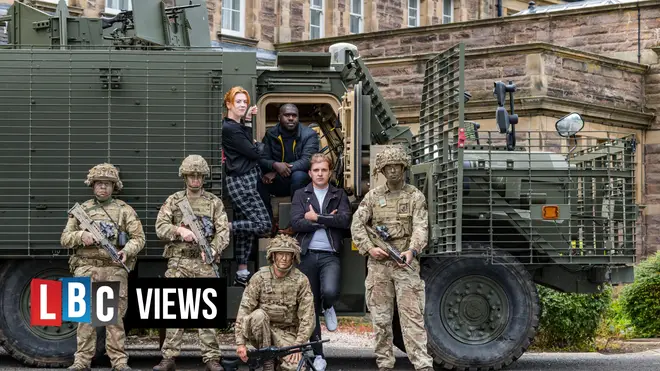
Nick Abbot 10pm - 1am
24 January 2024, 12:12 | Updated: 24 January 2024, 12:54

Over the past year, I, like many others from my generation, have become increasingly fatalistic.
Of course, part of this is the natural cynicism that comes with entering my mid-twenties. I’m podgier than I was, have a chronically defective knee and constantly worry about whether or not I can actually afford my ritual meal deal.
These concerns, though, fall into insignificance when contrasted with the root cause of my increased anxiety.
The war in Ukraine, instability in the Middle East and the seemingly perennial threat of Chinese expansionism in Taiwan has ushered in the greatest threat to peace in my lifetime. Respected MPs are talking about us facing a 1939 moment. The chairman of NATO's Military Committee has warned of conflict with Russia in the next two decades and, not to be outdone, Defence Secretary Grant Shapps last week lamented that we are "moving from a post-war to pre-war world".
Yet arguably the most significant intervention has come today from the head of the British Army, General Sir Patrick Sanders. In a heavily-trailed speech, Sir Patrick has argued that in the event of war with Russia, young people could be conscripted because our military is “too small”.
There would be clear differences between the conscription drives of WWI and WWII. Most obviously, our streets will not be tattooed with jaundiced-yellow posters of the moustachioed Lord Kitchener.
Instead, we’ll have the likes of Dermot O’Leary and Paul from The Traitors popping up on our social media feeds calling on us to do our duty.
But the horrors of conscription will remain the same. Unlike our predecessors, this generation would be going to the front line with a clear idea of the bloody realities of a global conflict, rather than being sustained by jingoism or the fantasy of a war that would be ‘over by Christmas’.
I simply cannot see Gen Z or millennials accepting this; conscientious objections and civil disobedience would be abundant.
To be clear, this is not a lazy caricature of much-maligned generations.
The reality is, given the unspeakable horrors that global conflict would ignite, they will rightly question why their blood must be spilled to compensate for the failures of successive governments to properly defend our national security interests.
In the last 20 years, troop numbers have fallen precipitously. In 2004, 114,000 brave men and women were serving in our armed forces - but that figure has dropped to just 75,000 now. Numbers are projected to slump even further, potentially dipping below 70,000 in the next few years.
Yes, some of this decline can be explained by the changing nature of warfare, but the stark reality is that we have paid insufficient attention to our defence capabilities for far too long.
Sir Patrick’s frustration is palpable and it should be a major wakeup call for everyone in the country, and in particular those who’ve overseen the gradual reduction in troop numbers and the forecasted falls in real-terms defence spending.
We have been too complacent for too long. To protect our country, and our young people, we must be prepared to make sacrifices to bolster our defences. Conscription should be a final resort, not a result of our failures to properly resource our military.
LBC Views provides a platform for diverse opinions on current affairs and matters of public interest. The views expressed are those of the authors and do not necessarily reflect the official LBC position.
To contact us email views@lbc.co.uk